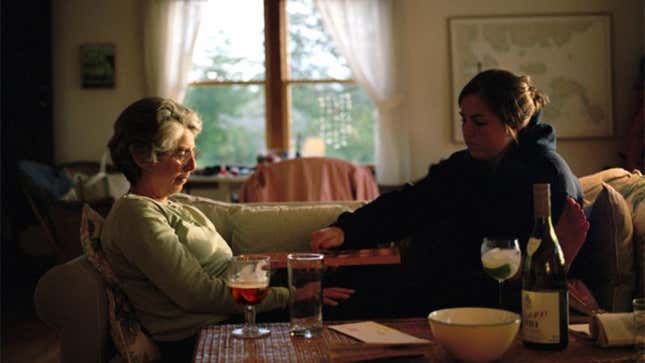
CHICAGO—Health experts have long known that drinking red wine can have such positive benefits as reducing blood vessel damage, lowering the risk of heart attack, and preventing harmful LDL cholesterol from forming. But researchers at the Northwestern University Department of Preventive Medicine have recently found that the consumption of four to six glasses of red wine, most notably at dinner or a family function, may be linked to totally going off on one's mom.
According to a study published Monday in The American Journal Of Medicine, a previously unknown ingredient in red wine has been shown to cause a marked improvement of vocal clarity and emotional acuity—while reducing overall inhibition—after only four glasses.
During routine trials, subjects who imbibed five glasses or more showed a remarkable increase in specific mental functions, such as the ability to recall every time their mothers had been unsupportive of their boyfriends or husbands.
A striking reduction in the time needed to translate personal epiphanies into loud, public epiphanies was also noted.
"It seems the benefits of red wine consumption are virtually limitless," said Dr. Susan Zheng, lead researcher on the study. "Many were unable to recall a single time their mother had paid more attention to their sister's soccer games than to their starring role in the school play. But after drinking only one bottle of standard Merlot, these participants could not only remember, but could actually sing whole stretches of Annie Get Your Gun, even while sobbing. It's extraordinary."
Dr. Zheng explained that the 100 women who participated in the study were split into two groups. One group was seated at the end of a long dinner table and subjected to backhanded compliments about their housekeeping abilities while steadily imbibing 8-ounce glasses of Turning Leaf Cabernet. The other group, a control group, was allowed to celebrate the holidays at home.
The positive effects of wine consumption were seen in as little as three hours, with 86 percent of participants showing greater resistance to unsolicited career advice, 77 percent displaying increased mental function in the area of the brain devoted to reminding you why Dad left you in the first place, and 60 percent demonstrating less concern to "play this little happy-happy game anymore."
Subsequent tests revealed that, if the wine is consumed prior to dinner or on an empty stomach, the benefits are increased nearly tenfold.
"I highly suggest every woman between the ages of 21 and 39 allow a few glasses of wine to be a part of their healthy diet," Dr. Zheng said before pouring herself the remains of an open bottle. "But what do I know. I'm just the lead researcher for an entire team of Northwestern grad students who look to me for the answer because I'm their boss. All my achievements are irrelevant because I never had any kids, right, Mom? Right?"
The long-term advantages of red wine consumption have also been noted among the well-adjusted and insightful people of France, where a bottle of claret is a regular part of mealtime from a much earlier age. In a recent survey conducted in the town of Saint-Florentin, researchers were unable to find a single person over the age of 20 who had not already reaped the benefits of letting loose on the soul-sucking banshee who brought you into this world just to torture you with endless comments about your hair and dress.
However, medical experts are quick to point out that red wine is not, in itself, sufficient to promote a healthy psyche. Similar positive effects have been found in other food and drink items, such as White Russians, vodka tonics, Canadian Club whisky with flat ginger ale, and anything served at a wedding.
"Thus far, we have been unable to determine any negative effects of increased wine consumption," said Dr. Hugh Van Pelt, also with the Northwestern team. "Some women have reported feelings of nausea and headaches the following morning, but they said these feelings were no worse than the nausea and headaches they felt for the days leading up to the dinner, so the results are inconclusive."
The Northwestern team is currently in the process of securing funding to determine what ingredient in bourbon enables one to finally wrestle one's stepfather to the ground.